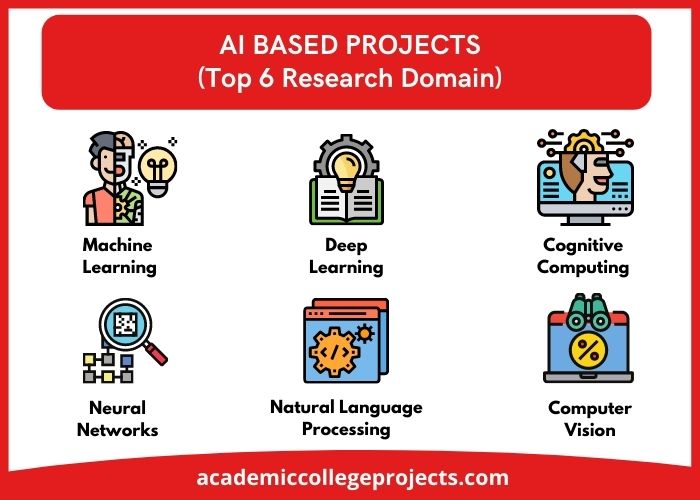A technology called Artificial Intelligence (AI) is intended to improve the intelligence of machines to achieve self-maintenance and self-directing. It enables to plan, design, and develop a machine with multi-tasking capability for solving real-time problems. These problems are solved automatically without human intervention.
Technically, it enhances machine productivity and performance through system automation. Particularly, it allows understanding the human interaction and making inter-responsive systems that behave like human brain actions.
Through this article, you can gain information about AI based projects with research ideas, limitations, areas, and techniques!!!
Before getting deep into AI, first, you have to know the intention of artificial intelligence. It focuses on system automation and control systems by utilizing the artificial human brain functions through neural networks. As well, it is fully machine-oriented technology to make them function effectively and independently without human involvement. Let’s see few more important objectives of artificial intelligence in the following,
What are goals of Artificial Intelligence?
- To develop AI solutions that overcomes real-time issues.
- For instance,
- Autonomous vehicles to prevent human-made accidents
- Robots to help disabilities people
- To design and develop machines to imitate human behaviors and thinking
- To enhance the performance, accuracy, and efficiency of the machines
Next, we can see the features of AI based Projects that grab the attention of people from both the industrial sector and the research sector. In recent days, everything around is moving towards advancements. Particularly, the demand for automated control systems is increasing more to reduce human participation and efforts. For this, the systems are needed to be capable enough for replacing human intelligence with machine intelligence. Our resource team is smart in enhancing machine intelligence through artificial intelligence. From our experience, we found that the following features of artificial intelligence enable us to accomplish expected machine intelligence.
What are key features of AI?
- Able to attain expected accuracy of data using deep neural network
- Able to learn and detect complex patterns through analyzing large-scale data
- Able to adapt new features and allow data to perform programming using progressive learning algorithms
- Able to perform a deep study on data through passing multiple layers
Artificial Intelligence is a wide-ranging platform that is enriched with incredible advantages and future scope. Nowadays, every research field has the impact of artificial intelligence to make automated control systems. As well, this platform allows performing software testing under time constraints for verifying efficiency. When utilizing AI, it is capable to detect altered controls faster than humans. This is possible by frequent up gradation of used algorithms. So, it can easily detect small changes. Further, here we have also given you the advantages of using artificial intelligence.
What are the benefits of using artificial intelligence?
- Fast to develop and deploy AI automated systems at low cost
- Compare to manual test, the automated AI-based test can virtualize a massive number of users who communicate with networks, apps, and other software
- AI-based test maximizes the software quality
- Make both testers and developers perform AI-based tests for its quality assurance and automation
- Greater accuracy in test outcomes
Next, we can see the general classifications of artificial intelligence. When you looking for AI based projects, the following technologies are highly recognized everywhere. Since these technologies collaborate with recent research areas of artificial intelligence. So, it is essential to know for performing AI research and development. Our developers have sufficient practice in handling all these AI technologies (algorithms/techniques). Also, we are ready to suggest more when you create a connection with us. Overall, we support you in all these and other technologies to attain your intended research objectives.
Taxonomy of Artificial Intelligence
- Instance-based
- Rule-based Reasoning (RBR)
- Case-band Reasoning (CBR)
- Artificial Neural Network
- Hopfield Network
- Back propagation
- Deep Learning
- Stacked Auto-encoders
- Bagging
- Convolutional Neural Network (CNN)
- Regression Algorithms
- Particle Swarm Optimization (PSO)
- Grammatical Evolution (GE)
- Support Vector Machine (SVM)
- Genetic Algorithm (GA)
- Clustering
- Self-Organization Map (SOM)
- Hierarchical Clustering (HC)
- K-Means Clustering
- K-Nearest Neighbours (KNN)
- Decision Tree
- Random Forest (RF)
- Conditional Decision Tress (CDT)
- Gradient Boosted Tress (GBT)
The working principle of AI is the combination of smart algorithms and iterative processes. This process aims to learn the data features automatically to identify hidden facts. Moreover, it is an extensive field to study the contextual theories, technologies, and methodologies of computer-assisted systems. Although this field technologically advancing, it also comprised limitations in real-time implementation. These limitations spring out numerous research ideas for AI based projects. For your information, here we have given you some significant limitations in current research areas of AI.
Limitations of Artificial Intelligence
- Need to enhance the capability of imitating human actions just like natural
- Need to reduce cost of design and development
- Need to match with creative thinking ability of human for making decision
- Need to minimize cost of maintenance and repair
- Need to experience the human warmth even though it is super-smart robots.
Next, we can talk about three different phases of artificial intelligence as narrow AI, General AI, and Super AI. By the by, it clearly explains to you the technological advancements of AI Based Projects in recent days. In other words, it presents you with the order of evolution in artificial intelligence. Let’s have a quick look over them in the following,
What are three Stages of Artificial Intelligence?
- Narrow Artificial Intelligence (Weak)
- In this, we can able to work with only small-scale predetermined techniques
- For instance: Retail Kiosks, Self-driving UAV, etc.
- General Artificial Intelligence (Strong)
- In this, we can able to balance the human mind’s ability to operate automatically based on collection of stimuli
- Super Artificial Intelligence
- In this, we can able to get into the computing apps in high human intelligence through narrow AI where Narrow AI act as first step
As mentioned earlier, AI spreads out in several research fields due to its beneficial features and impact on smart technologies. Now, we can see the list of the most important research fields of artificial intelligence. As well, it includes the general purpose of each field in the AI domain. And also, these fields are again classified into different sub-fields. For instance: deep learning – CNN, DNN, RNN, RL, SVM, etc. Our R & D teams have well-equipped knowledge in all these fields with their respective sub-fields to support you by all means to develop AI based projects. So, communicate with us, to know interesting research ideas for your AI projects for final year cse students.
AI Based Projects Research Topics
- Machine Learning
- Used for constructing automated analytical model
- Deep Learning
- Used for understanding complicated patterns in large-scale data
- Cognitive Computing
- Used for interaction with machines which is same as human
- Neural Networks
- Used for processing data through interconnected links to reply exterior inputs
- Natural Language Processing
- Used for producing and investigating human language like speech
- Computer Vision
- Used for detection of video / image using pattern identification
In addition, we have also given you the vibrant enabling technologies of artificial intelligence. These technologies are expected to rule the future generation of AI technologies through their mastering capabilities. We support you not only on these technologies but also on other budding technologies for developing AI based projects. Further, if are curious to know other budding technologies, then approach us.
Once you connect with us, we let you know the new dimension of AI in current research directions. As well, we also provide numerous pearls of ideas in your interested research areas of AI with detailed explanations on each.
AI-enabled Technologies
- Graphical Processing Unit (GPUs)
- Application Programming Interfaces (APIs)
- Internet of Things (IoT)
Commonly, AI is a fast-growing method to simulate human intelligence over computer-assisted machines. The four fundamental technologies of artificial intelligence are Natural Language Processing (NLP), Machine / Computer Vision, Expert systems, and Speech Recognition. Further, it also expands in other emerging research fields. Here, we have listed few significant research fields for AI based projects. We assure you that provide end-to-end guidance in all the research areas of these fields. Further, we also support you in other budding AI fields and areas.
What are the current trends in Artificial Intelligence (for implementing AI based projects)?
- Image Representation
- Image Identification
- Machine Learning
- Deep Learning
- Audio Recognition
- Text-to-Speech
- Speech-to-Text
- Natural Language Processing
- Classification
- Question and Answers
- Generation of Text
- Machine Translation
- Context Filtering
One important concept of AI is Natural Language Processing (NLP) which is used for establishing communication among smart systems by an understanding of the languages. It uses natural language as English through machine translation, speech processing, etc.
For instance: if you want to instruct the robots for performing any kind of task, then robots need to respond about their decision like dialogue-assisted clinical expert system, etc.
Overall, this NLP makes machines interact like humans and perform human instructed tasks. As well, the NLP input and output are in the form of written text and speech. Further, we have also highlighted the vital applications and purposes of NLP in the below list.
What is NLP used for?
- Interactive Voice Response Assistant – Call Centre Voice for user’s request
- Language Translator Assistant – Google Translate
- Individual / Private Assistant – Cortana, OK Google, Alexa, and Siri
- NLP-based Word Processors – Grammarly and Microsoft Word (check grammar)
Furthermore, we have also given the common methodologies of NLP. The following methodologies are sure to yield satisfactory results smartly. As well, we also create our own algorithms to manage complicated research issues in implementing AI Based Projects. So, we are glad to say that we are proficient to develop any sort of application at any level of complexity. Likewise, we also provide backing on other growing research areas of artificial intelligence.
Based on your project needs, we will suggest appropriate development tools, technologies, techniques, datasets, etc. Overall, we provide complete support for project code developments in all respects.
What are the techniques used in NLP?
- Semantics
- Generation of Natural Language
- Named Entity Recognition (NER)
- Word Sense Disambiguation
- Syntax
- Stemming
- Segmentation
- Parsing
- Lemmatization
- Word Segmentation
- Sentence Breaking
- Part-of-speech (PoS) Tagging
- Morphological
To sum up, we are here to give the best guidance on your AI based projects and research. We assure you that we provide fine-tuned services on each phase of AI study under the supervision of our experts. In addition to research and code development, we also provide manuscript writing services along with publication support on reputed journals. In this, the writing service includes a research proposal, literature survey, paper writing, dissertation writing, and thesis writing. Then, the journals include IEEE, Springer, ScienceDirect, etc. So, we hope that you have this opportunity to create a bond with us for attaining your research goals in the AI field.



